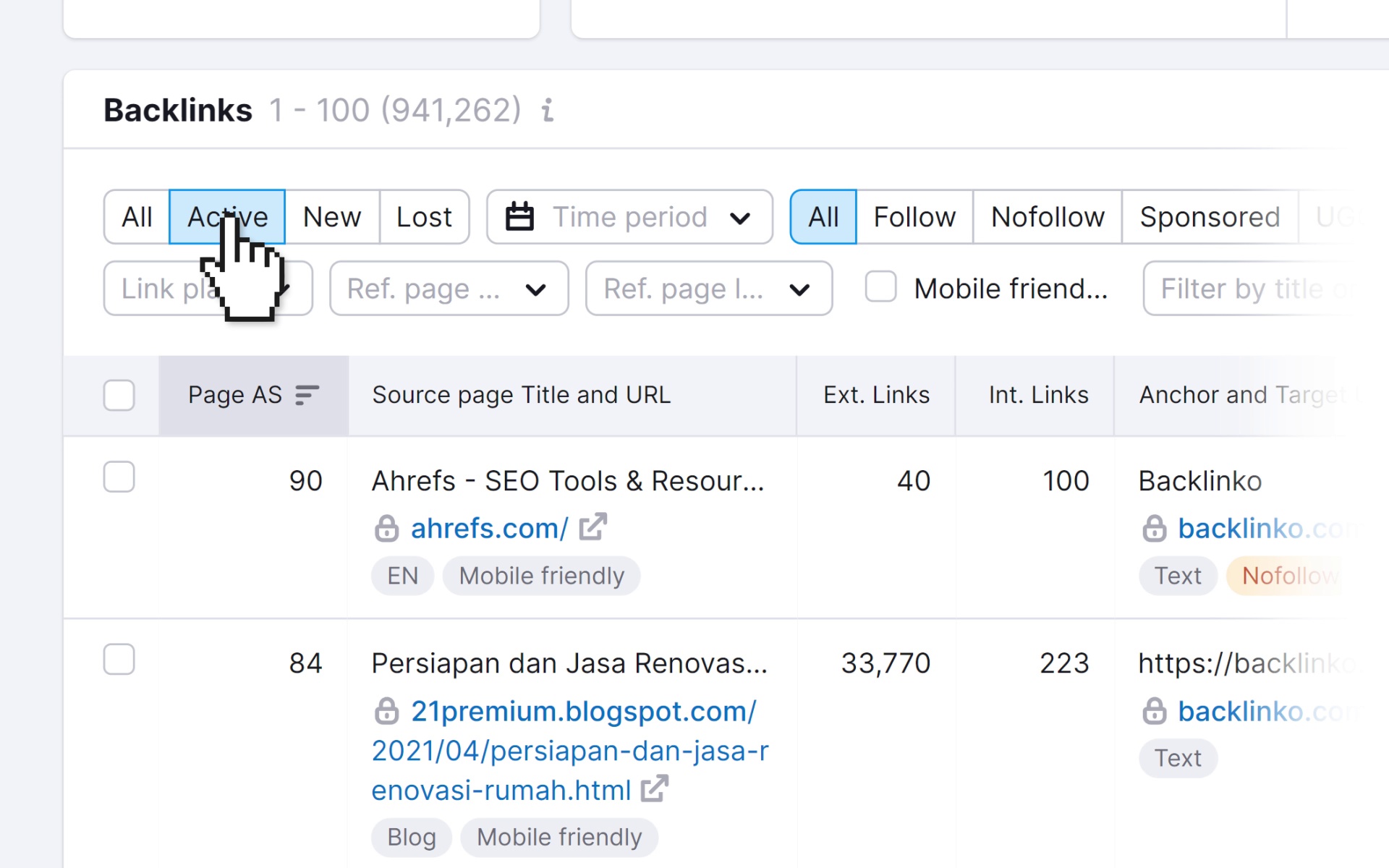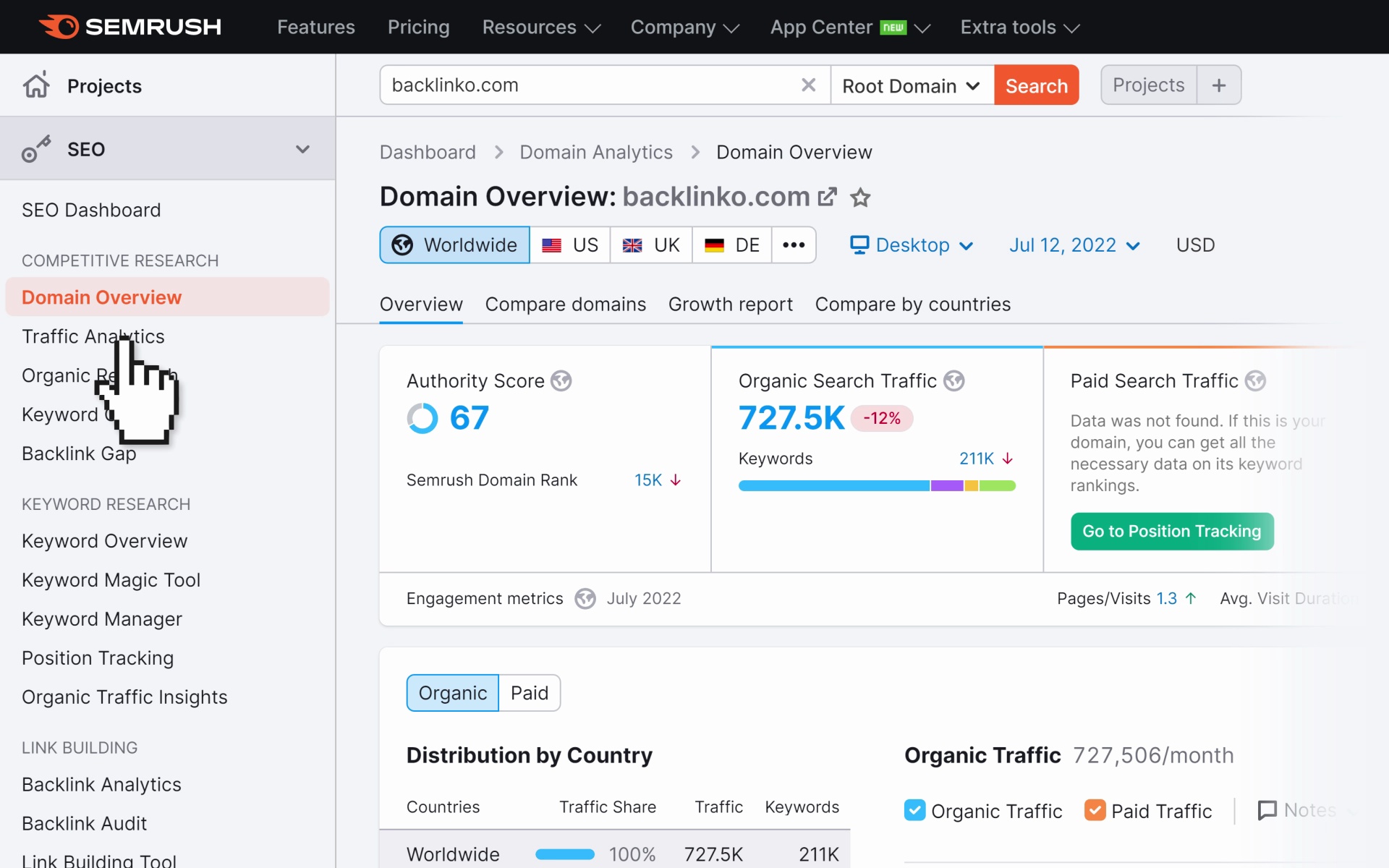Semrush Review: Details, Features & Pricing
Written by Brian Dean
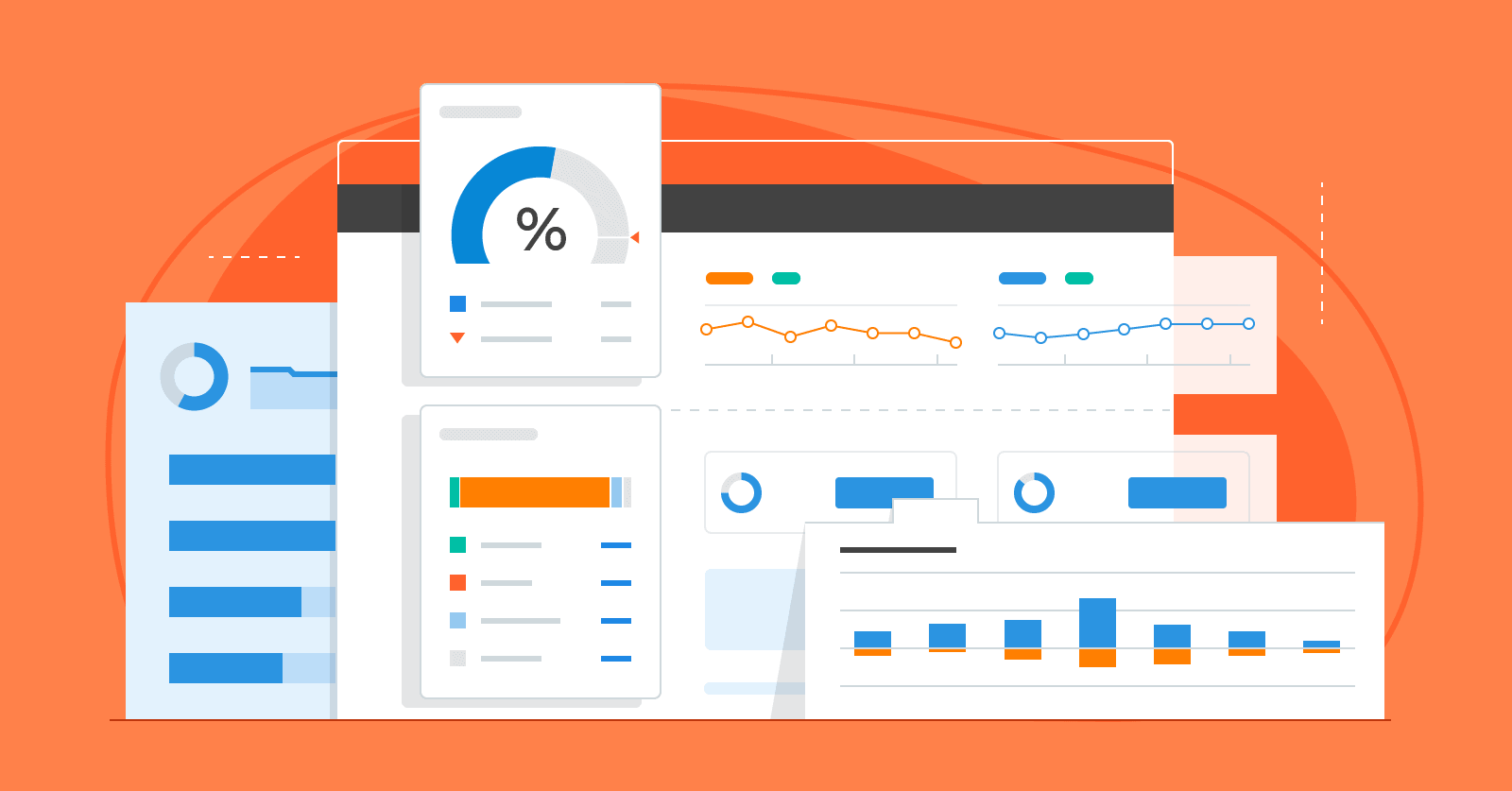
Semrush is a leading SEO and digital marketing tool, and it has been around since 2008.
But is it the best on the market? And should you use it for your website?
In this post you’ll see:
- What Semrush does well
- What Semrush doesn’t do quite as well
- My opinion of Semrush’s SEO and PPC features
- Whether Semrush is worth the monthly fee
Let’s go through each of the main tools and talk about the pros and cons of each.
Note: You can follow along with my assessment of the tools below by signing up for a free Semrush account. Or use this link to get a 14-day trial of a Semrush Pro subscription.
Domain Overview
This is a big picture overview of a site’s overall SEO and PPC marketing efforts.

And if you want to dig deeper, you can get details on a site’s organic traffic, PPC campaigns, engagement metrics (like bounce rate), the site’s main competitors in Google search, and more.
This report is helpful if you want to quickly see how much traffic a site gets from SEO or Google Ads.
You can also gain useful insights about any website’s backlink profile. Including their top anchors and referring domains.

Therefore, The Domain Overview is great for getting a high-level look at your site or competitors.
But Semrush’s other tools are where you can extract more specific data about a website.
Reveal any company’s website traffic
Spy on your competitors’, prospects’, and potential partners’ website traffic.
Traffic Analytics
Traffic Analytics shows you more detail about a website’s traffic. Including where it came from, how users interact with the website, and even what percentage of them make a purchase.

Traffic Analytics also shows you non-Google sources of a site’s traffic.
For example, Semrush estimates that Backlinko gets 803.4K unique visitors per month.

This estimate includes organic traffic generated through SEO. But it also takes into account YouTube, social media, other blogs, and direct traffic.
How accurate is that number?
Well, according to our Google Analytics, we got 451K unique visitors (“Users”) over the last 30 days.

So at least from this one example, Semrush’s traffic estimates are a bit higher.
But it’s still useful to gauge how much traffic a website gets and where those visitors come from.

This can help you understand which marketing channels your competitors are using.
(And what’s working.)
You can then adapt your own marketing strategies accordingly.
Organic Research
Organic Research tells you how much traffic a site gets from Google and how it has changed over the years.

The focus here is on organic traffic (hence the name).
And the tool’s methods to calculate the numbers may cause some variation with Traffic Analytics.
But, the report’s real value is its regularly updated list of keywords that a site ranks for in organic Google search. You can find it in the Positions tab.

In my experience, reverse engineering your competitor’s keywords is one of the best keyword research strategies on the planet.
And Semrush is one of the best SEO tools on the market for this approach.
That’s because Semrush has a HUGE database of more than 25 billion keywords. And they update this list all the time.

So, Organic Research is a great place to start your analysis for finding content to create.
Speaking of keyword research…
Keyword Magic Tool
Semrush’s Keyword Magic Tool is one of the most powerful on the market. And it lets you find thousands of relevant keyword ideas in seconds.

You just pop a seed keyword in and the tool will provide lots of related search terms.
And you can filter and sort these by metrics like:
- Search volume
- Keyword difficulty
- Search intent
To only show keywords related to your business that you can rank for.

Plus, if you add your domain, you’ll get AI-powered, personalized data relevant to your website.

This makes the Keyword Magic Tool a super useful way to find keyword ideas that can drive real results for your business.
Backlink Analytics
Next up is Semrush’s backlink checker feature. The Backlink Analytics tool gives you access to useful data about your backlink profile and those of your competitors.

Overall, I think Semrush’s backlink checker is SUPER good.
That’s because Semrush has a massive link index. And it finds new pages and backlinks FAST.
While I do prefer the Ahrefs link analysis UI, Semrush’s is still really good.
Specifically, they have dozens of filters that you can use to find the backlinks that you want to find. Like those that are active and not marked with “nofollow.”
Overall, Semrush’s backlink checker is comparable to Ahrefs in many ways.
It has a solid index. And a ton of features, like domain authority metrics (called “Authority Score” in Semrush), anchor text breakdown, number of links a site has received over time, and more.
Semrush’s backlink tool even has a few cool features that Ahrefs doesn’t have.
For example, Semrush actually breaks a site’s referring domains down into different categories.
For example, 25% of our backlinks come from sites in the “Marketing” niche. And another 25% are from websites that Semrush considers “Search Engine Optimization & Marketing.”
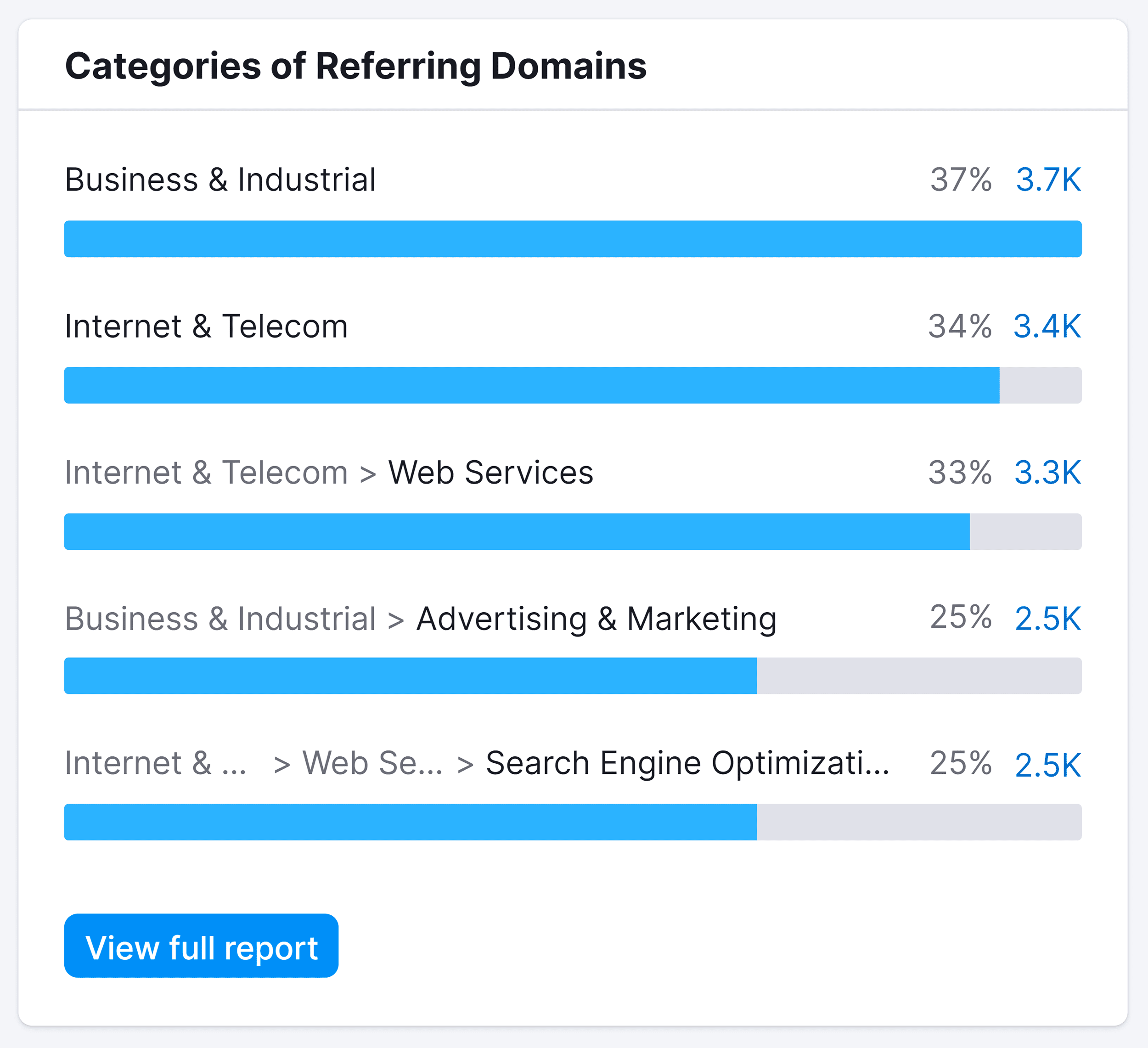
That sounds about right to me.
Backlinko is about digital marketing and SEO. So it makes sense that most of our links would come from other sites on those topics.
But if I was analyzing our competitors, this kind of data would help me understand if there are markets our competitors are getting links from that we’re not. And I could adjust our link building efforts accordingly.
Semrush also shows you a list of websites that have similar link profiles.
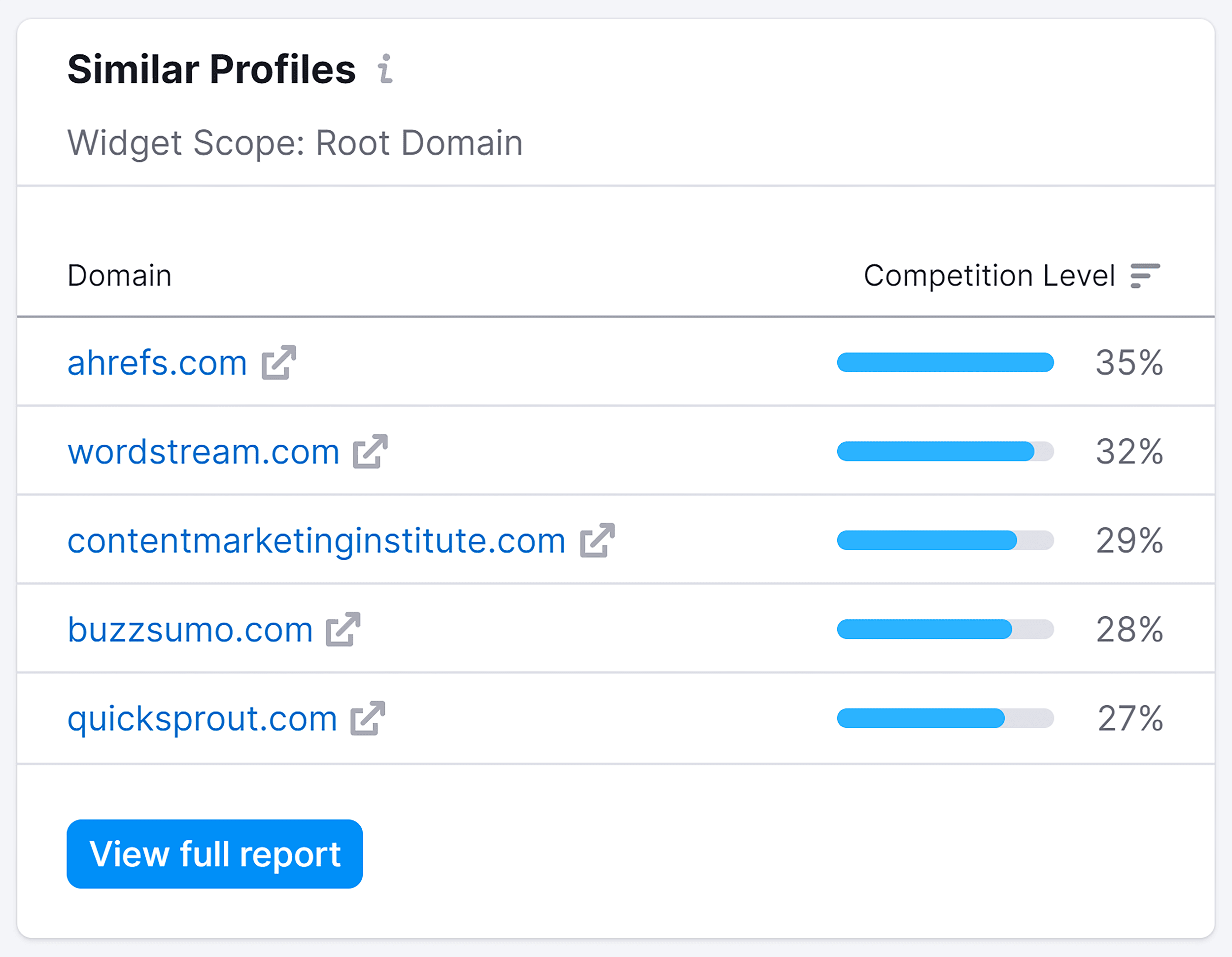
This can be super helpful if you’re kicking off a link building campaign.
Why?
Because it can help you find the right sites to reverse engineer. After all, if a site has a similar link profile to you or your competitors, it probably means that they’re getting links from places that you want to get links from.
Find all of your backlinks
Explore the largest, fastest, and freshest backlink management tool.
Advertising Research
Most SEO tools tack on a PPC feature as an afterthought.
But that’s not the case with Semrush. They’ve been PPC-focused since day 1.
And they continue to pour a ton of their resources into their PPC competitive analysis features.
In fact, you can use Semrush to see pretty much every ad that a competitor is running. And how much traffic those ads bring in.

They even have estimated CPCs to give you an idea of how much that site is spending on Google Ads every month.
That’s already super valuable intel.
But the real gem here is the ability to see the exact ads that your top competitors are currently running.

If you’re familiar with Quality Score, you know that one important factor is your ad’s click-through rate (CTR). The higher your CTR, the less you’ll often have to bid.
And if you see that a competitor has been using an ad for months or years, you KNOW that it’s getting a decent CTR. Otherwise, they wouldn’t be using that ad.
For example, the Ads History tab shows us that Amazon has consistently ranked their ad in the top position for the term “owala water bottle.”
That keyword likely drives many sales, so the ad has been running for more than a year.

And if you want to see even more ad copy and keywords to use as part of your PPC campaigns, head to the Competitors tab. And you’ll get a list of sites that are all bidding on the same keywords.

To be clear: Semrush isn’t just for PPC ads.
They also have a solid display advertising feature in their App Center called AdClarity.

Not only can you see their display ads:

But you can even get a list of the exact sites that they’re advertising on:

Overall, Advertising Research is one of Semrush’s best features.
But combine that with the Ad Clarity app and you get access to some immensely powerful advertising data.
Market Explorer
Market Explorer is designed to show you the landscape of a given niche.
For example, when I put Backlinko into Market Explorer, it shows me the “Established Players” and “Game Changers” that are growing quickly.

You can even see which sites get the lion’s share of traffic in that space.

Why is this useful?
Well, let’s say you just took on a new client, and they’re in a niche you know nothing about.
It can take days of research to figure out who you’re even competing against. And who the established sites are.
Semrush’s Market Explorer report makes this sort of market analysis much easier.
Keyword Overview
Semrush’s Keyword Overview tool lets you perform a deep analysis on a single keyword.
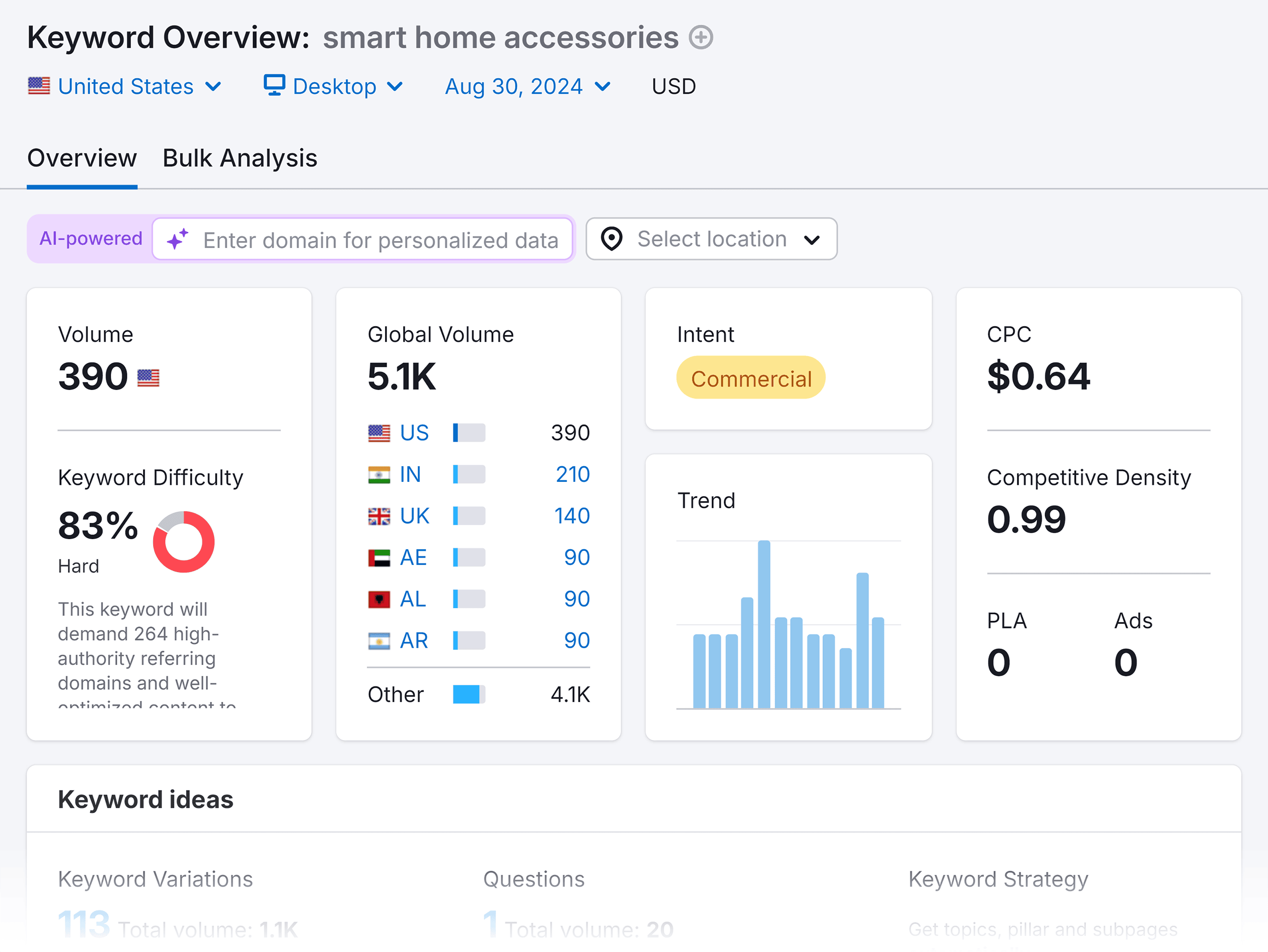
In this report you can see a keyword’s search volume, keyword difficulty, CPC estimates, and more.
And you can see the first page competition for that keyword in the search engine results pages (SERPs).

What I like about this feature is the massive set of keyword ideas that you get.
Specifically, Semrush generates keyword ideas through variations, questions, and “keyword strategy” (which provides an example pillar page and topic clusters).

For example, here are variations that Semrush has for the keyword “social media marketing.”

Yeah, there may be some long tail keywords that you hadn’t thought of here. But for the most part, it’s not great for uncovering new keywords. (That’s what the Keyword Magic Tool is for, which I discussed earlier.)
On the other hand, the list of related “questions” IS really helpful.

That’s because it generates questions that I probably wouldn’t have thought of on my own (which is kind of the point of using a keyword research tool in the first place).
Start your keyword research
Explore the largest keyword database.
Keyword Gap
Keyword Gap compares your keyword ranking with a handful of competitors.

The idea here is that you can find keywords that many of your competitors rank for in Google, but you don’t.
And overall, it works super well.
Note: this assumes that you put in competing sites that are on or close to the same level as you are in terms of authority and overall SEO. And that are actually related to your business.
For example, when I analyzed a handful of competitors, Semrush found a list of keywords that I should optimize around.

You even get a list of terms that you and your competitors all rank for.

That way, you can find keywords you are already ranking for, but have the potential to rank higher with some on-page optimization or link building.
For example, our local SEO guide is ranking #3 in Google.

So instead of spending time on a completely new piece of content, I might be better off working to improve that page.
While the Keyword Gap tool is great for finding, well, gaps in your keyword strategy, it’s also great for finding opportunities to build on what you currently have.
Topic Research
The Topic Research tool is more for content marketing than straight up SEO.
Here’s how it works:
Enter a topic that you want to write about on your website. Semrush will then find a bunch of related topics. And specific pieces of content that have done well.
For example, when I put “plants” into this feature, it listed a bunch of similar topics.

I can then click the “Show more” button to get even more ideas for that topic cluster.
Like headlines, questions, and related searches.

This makes it a great tool for sparking inspiration for new content ideas.
SEO Content Template
Semrush’s SEO Content Template scans the top 10 organic search results for the keyword you want to rank for.
Then, it finds words and phrases that these pages use in their content.

The idea here is that these pages rank partly because they cover a topic in-depth. And use the type of LSI keywords that Google may understand as relevant to that topic.
To be clear: LSI keywords are NOT an SEO magic bullet. But using them CAN help Google understand the relevance of your content to a given keyword. Which may improve your chances of ranking for it.
It’ll also show backlinks you might want to acquire, along with readability and word count recommendations.

Finally, it’ll also show you how your competitors are using your target keywords.
So you can understand how often and where they use the keywords.

You can also use the Real-Time Content Check tab to jump into the SEO Writing Assistant.
This will show you even more recommendations across your content’s SEO, readability, tone of voice, and originality.

The SEO Content Template and Writing Assistant tools are great for performing quick on-page optimizations of your content.
Position Tracking
This is Semrush’s rank tracking feature. And you can use it for both organic and paid rankings.

Like any good rank tracker, this one shows you how your rankings have shifted over time, your site’s overall search engine visibility, and your rankings distribution.
You can even see a cannibalization report. This shows any instances where multiple pages are competing for the same keywords.

Being able to track your Google Ads rankings is ideal for those running paid campaigns too.
You can use this data to ensure your campaign budget is being spent effectively and to identify ads that are not performing well.

So, the Position Tracking tool from Semrush is an essential tool for monitoring your SEO and PPC campaigns.
Site Audit
Semrush also has a super in-depth SEO site audit tool built into it.

In my opinion, this is one of the better SEO audit tools on the market (right up there with Ahrefs).
That’s because their “Site Health” percentage score makes it easy to size up your site’s overall technical SEO health.

But if you want to get into the weeds, you can.
For example, if you run an ecommerce site with thousands of pages, Semrush will scan them all.
And give you plenty of things you can do to improve your site’s crawlability, indexing, internal linking and overall performance.
For example, Backlinko has a site health score of 71%.
That’s not bad. But, as you can see, there’s plenty of room for improvement.

Specifically, some of my pages have a large HTML size (which hurts page loading speed). This tool also tells me that I need to cache more of my CSS.
Some of these are definitely nitpicky things that won’t necessarily make a big difference in your rankings individually. But fixing lots of small issues across your site can lead to measurable results.
So if you want to make sure that your site’s technical SEO is 100% on point, Semrush’s Site Audit tool is a great way to do it.
Link Building Tool
Most SEO tools give you tons of data. But they leave the execution up to you.
Semrush’s Link Building Tool is designed to change all that.
Instead of having one tab open to Semrush and another one for sending outreach emails, Semrush’s Link Building Tool ties them together.
That way, you can actually do the important work (outreach) without having to leave the platform.
You can use this feature for link prospecting (finding sites that are likely to link to you).
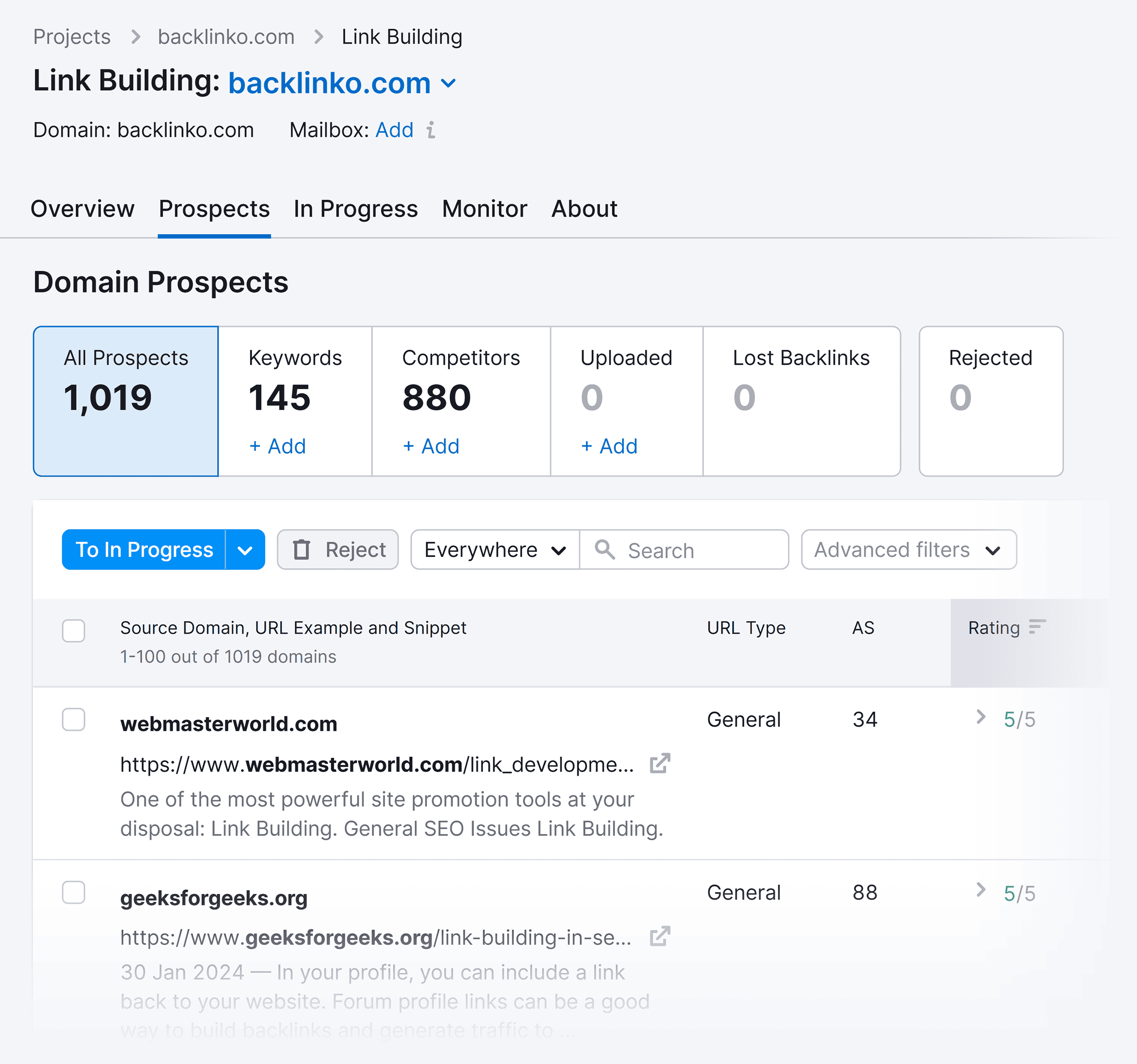
You can also use this tool to send outreach emails and track your results.
This streamlines the process from finding relevant prospects to actually getting links.

While you still need to create quality content and have a site that people want to link to, there’s no doubt that the Semrush Link Building Tool can do a lot of the heavy lifting for you.
Semrush Support
I outlined my experience with Semrush’s customer support in my Ahrefs vs. Semrush comparison.
Semrush offers live chat while logged in:
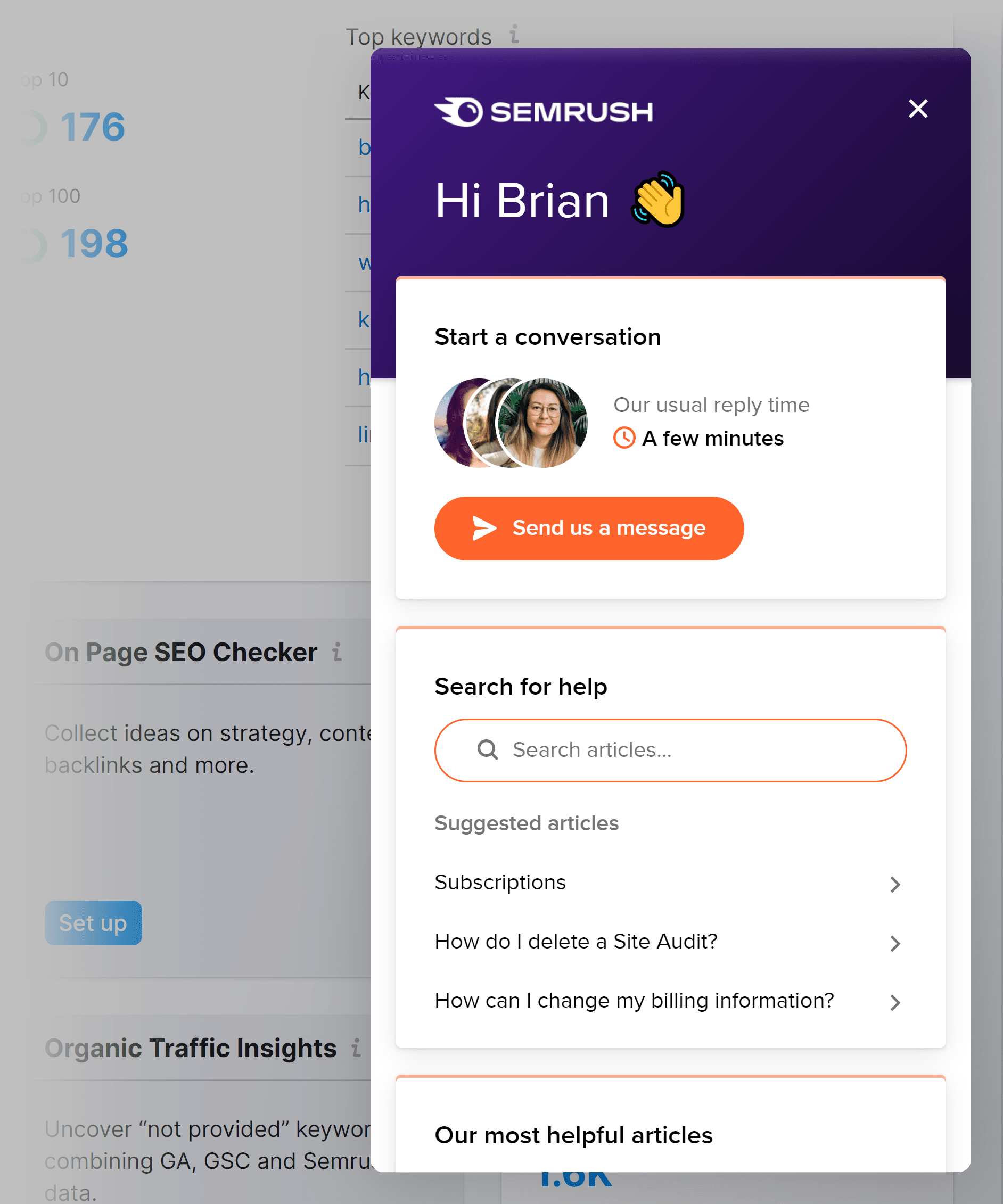
Overall, their support is excellent. And fast.
And they have a help center too, with guides for specific tools, and other aspects of the Semrush SEO suite.

Semrush Pricing
Here’s a full breakdown of Semrush’s current pricing:

They have three main tiers:
- The Pro plan ($139.95/mo) is ideal for those with a couple of sites (“Projects”) they’d like to track the performance of. And that don’t need some of the features like content marketing tools or Looker Studio Integration.
- The Guru plan ($249.95/mo) gives you access to the content marketing tools. Along with higher page crawl limits in Site Audit, more trackable keywords, and a greater number of projects.
- The Business plan ($499.95/mo) adds even higher limits and some extra metrics. And you get API access too.
There is also an enterprise solution for those that need it, but you’ll need to contact the Semrush team to find out more about pricing for that.
If you’re not convinced about a paid plan, there is a free Semrush plan too. This gives you limited access to lots of their tools to try before you buy. Or you can use this link to get a 14-day trial of a Pro subscription.
Semrush: Things I Like
Let me now cover some of my favorite parts of the Semrush platform.
Reliable data: Data is the backbone of an SEO tool like Semrush. And Semrush’s SEO and PPC data are world-class and always up to date.
Unified platform: One of the strengths of Semrush is that everything is connected. Which can make some of their features faster and easier to use.
For example, when you analyze a site’s organic rankings, you can quickly see that site’s backlinks, traffic stats, and more. And clicking specific metrics (like backlinks) can take you to in-depth reports in other tools (like Backlink Analytics).
Unique set of SEO and PPC features: This SEO toolkit has so many features that I didn’t have a chance to cover all of them in this review. But you can learn more about them in my full Semrush guide.
So yeah, there are a TON of features inside Semrush. And the Semrush team is always innovating and adding new features to the platform.
Semrush: Things I Don’t Like
Here are some things about Semrush that I wasn’t a huge fan of.
Organic traffic estimates can be off: Like any SEO tool, Semrush’s organic traffic estimates aren’t always super accurate. This isn’t really a knock on Semrush specifically, as all SEO tools suffer from this.
Missing click data: If you want to really dig into a single keyword, Semrush does the job. But Ahrefs is a bit better in this regard.
Why? Ahrefs gives you more data to work with. Data that helps you decide whether or not a keyword makes sense for you.
For example, in Ahrefs you don’t just get monthly search volume. They also show you how many people click.
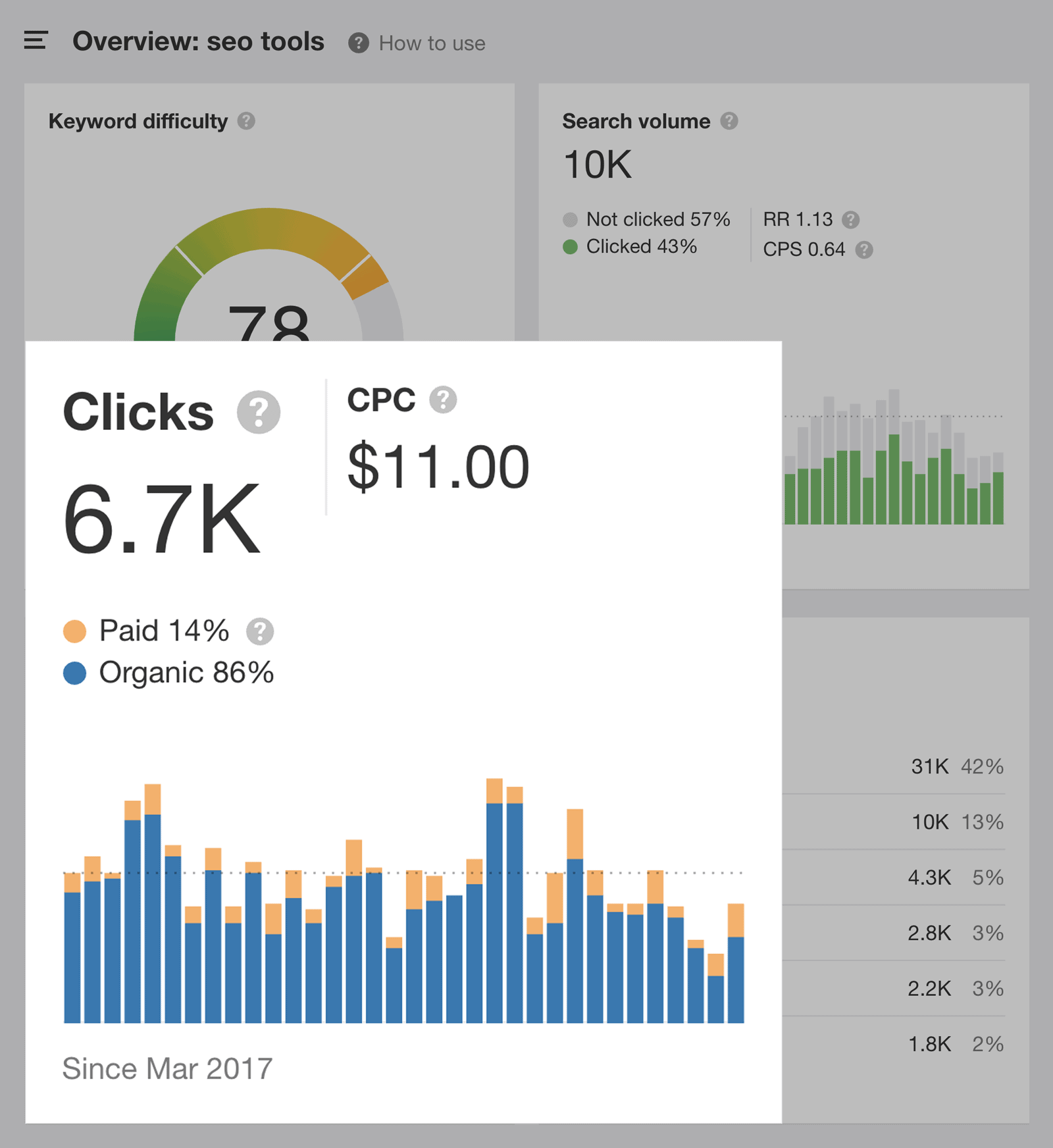
This is helpful data that Semrush doesn’t currently have.
Click-heavy UI: As you can probably tell from reading through this review, the platform has A LOT of features. This means that it usually takes 3-5 clicks to get to the specific report that you need. This is testament to the sheer power of the tool, but it can be a little overwhelming for beginners.
The Bottom Line: My Semrush Review
Semrush has a set of industry-leading features that are backed by a large index of keywords, backlinks, and advertising data. This is why Semrush has become one of the most popular and trusted marketing tools.
Personally, I’ve been paying for Semrush every month for over 11 years now.

I do SEO all day long. So I find myself logging into Semrush all the time to check my own site’s SEO health and rankings. I also use it a lot for competitor research.
Even though I only use maybe 10-15% of what Semrush offers, I still get enough value out of it to justify my monthly payment.
If SEO, PPC, and digital marketing in general are a big part of your business’s strategy, I recommend Semrush.
